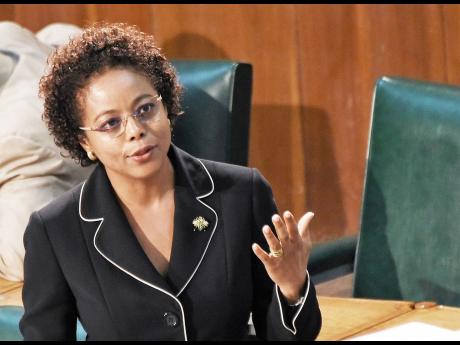‘Insane’ secrecy - Gov’t urged to reveal redacted court ruling dooming 2004 MOU with US
Pressure continues to mount on the Government to give greater insight into a new security deal brokered with Washington last Wednesday that replaces a landmark electronic surveillance memorandum of understanding (MOU), which has reportedly been deemed by the court to be "unsatisfactory".
National Security Minister Dr Horace Chang revealed in Parliament on Tuesday that the cooperation deal collapsed because a Supreme Court ruling in 2018 found that the MOUs signed with the United States, United Kingdom, and Canada were “inadequate”.
Such security arrangements are often not disclosed because of their sensitivity, but the scope, reach, and controversial nature of the new pact, which could facilitate extraditions of Jamaicans to the United States, was “very strange”, says noted attorney-at-law Michael Hylton, QC.
“It is not unusual for the courts to make a ruling and not name the parties. So sometimes, the court hears a case and there is something confidential about it, and the decision is published and it says, A against B, or X against Y. But it has the ruling because as I said, the ruling affects other cases and other people, so the court wants the ruling to be public, but you don’t want to breach any confidence or expose any national-security concerns,” he said.
Hylton contends that the unavailability of the ruling creates another legal hurdle.
“The discussion that we are having shows how problematic it is because .... people have been questioning, ‘Does it affect extraditions and orders that have taken place in the past?’ Can people make a claim? How does anybody know if they can make a claim if they don’t know what the court ruled? It’s insane.”
Attorney General Marlene Malahoo Forte yesterday said that the Government would consider releasing redacted portions of Operation Anthem, the Peter Phillips-era MOU signed in 2004 that was used in the extradition of drug kingpins like Tivoli Gardens crime lord Christopher ‘Dudus’ Coke, who was whisked away after a bloody firefight in his Tivoli Gardens haven and a monthlong islandwide manhunt.
“I could consider, but as you know, I am in the position of an attorney-at-law, and I would have to take instructions on the matter,” Malahoo Forte said in an interview on RJR’s daytime radio talk show ‘Hotline’ with Emily Shields.
She also confirmed that the MOU was part of the documents used in the application to the court last year.
Citing national-security concerns, neither Malahoo Forte nor Chang have been willing to offer any details of the 2018 court matter, which, The Gleaner understands, was heard privately in chambers.
Meanwhile, in a letter to The Gleaner yesterday, prominent attorney-at-law Frank Phipps, QC, believes that the use of the MOU in the extradition of Coke was illegal.
“There are circumstances in law that allow admissibility of evidence illegally obtained. Much will depend on the nature of the evidence and how it was obtained, but this should not be where the illegality is a breach of the Constitution of Jamaica,” said Phipps, who represented embattled then Prime Minister Bruce Golding in a commission of enquiry into the hiring of a US lobby by his Jamaica Labour Party.
He added: “Dudus should never have been a fugitive for extradition on illegally obtained evidence that breached the Constitution. He was robbed of the protection of law in his own country when the country surrendered its authority to secure its legal jurisdiction boundaries. This ugly situation invites a review of the protection and the enforcement of human rights in Jamaica since Independence.”

